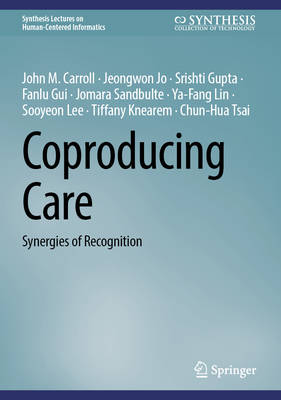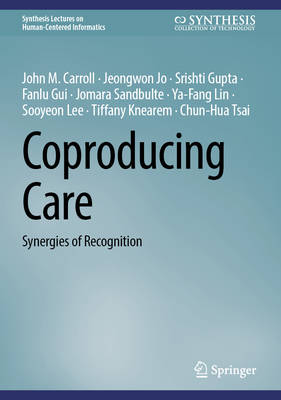
Bedankt voor het vertrouwen het afgelopen jaar! Om jou te bedanken bieden we GRATIS verzending (in België) aan op alles gedurende de hele maand januari.
- Afhalen na 1 uur in een winkel met voorraad
- In januari gratis thuislevering in België
- Ruim aanbod met 7 miljoen producten
Bedankt voor het vertrouwen het afgelopen jaar! Om jou te bedanken bieden we GRATIS verzending (in België) aan op alles gedurende de hele maand januari.
- Afhalen na 1 uur in een winkel met voorraad
- In januari gratis thuislevering in België
- Ruim aanbod met 7 miljoen producten
Zoeken
Coproducing Care
Synergies of Recognition
John M Carroll, Jeongwon Jo, Srishti Gupta, Fanlu Gui, Jomara Sandbulte, Ya-Fang Lin, Sooyeon Lee, Tiffany Knearem, Chun-Hua Tsai
€ 29,95
+ 59 punten
Omschrijving
This book explores research around reciprocal participation in care activities across a variety of everyday settings from the perspective of HCI researchers. It challenges traditional conceptions of caregiving in which care is provided and received and highlights the synergistic outcomes that can be obtained when all participants are active contributors. Through diverse case studies, including family and local community dynamics, the book illustrates how coproduction can enhance the efficacy of care while also increasing the personal empowerment, community engagement, and social capital of those receiving, providing, and designing care services. The research posits that recognizing and leveraging the capacities of all stakeholders, including marginalized members, can lead to more effective and inclusive care system design and implementation. The book suggests that coproduction can reshape how care is perceived and delivered, and it proposes research practices for HCI practitioners and beyond for designing to facilitate such coproduction of care. Seven case studies relating to a wide range of coproducing care situations are examined, including examining how stakeholders with different capacities coproduced overall well-being and childcare support in family dynamics and relating to local water quality, volunteer efforts, disaster relief programs, food security initiatives, and even beer-brewing events with collective settings. The book provides a comprehensive framework for understanding coproduced care, highlighting its benefits in fostering equality and agency among individuals and generating synergistic collective outcomes as a contrast to the traditional care delivery.
Specificaties
Betrokkenen
- Auteur(s):
- Uitgeverij:
Inhoud
- Aantal bladzijden:
- 53
- Taal:
- Engels
- Reeks:
Eigenschappen
- Productcode (EAN):
- 9783032043030
- Verschijningsdatum:
- 21/01/2026
- Uitvoering:
- Hardcover
- Formaat:
- Genaaid
- Afmetingen:
- 168 mm x 240 mm

Alleen bij Standaard Boekhandel
+ 59 punten op je klantenkaart van Standaard Boekhandel
Beoordelingen
We publiceren alleen reviews die voldoen aan de voorwaarden voor reviews. Bekijk onze voorwaarden voor reviews.









